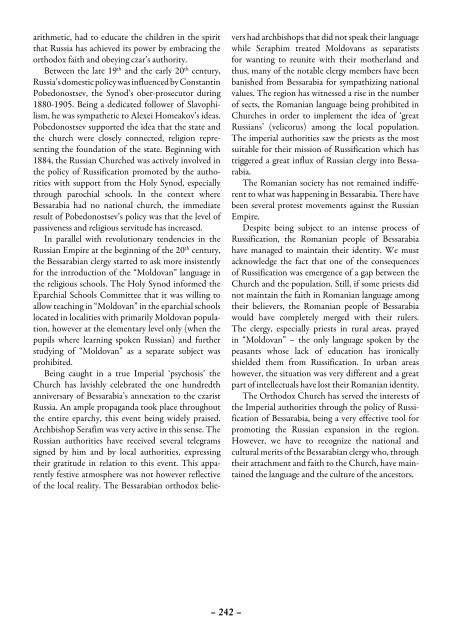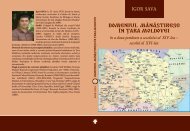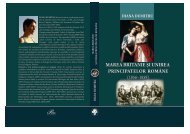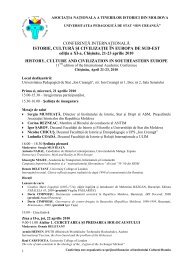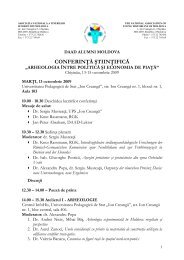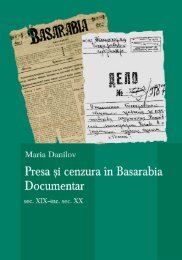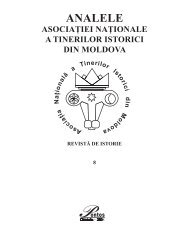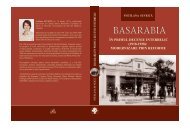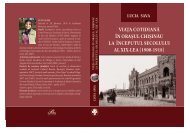aici - Asociatia Tinerilor Istorici din Moldova
aici - Asociatia Tinerilor Istorici din Moldova
aici - Asociatia Tinerilor Istorici din Moldova
You also want an ePaper? Increase the reach of your titles
YUMPU automatically turns print PDFs into web optimized ePapers that Google loves.
arithmetic, had to educate the children in the spirit<br />
that Russia has achieved its power by embracing the<br />
orthodox faith and obeying czar’s authority.<br />
Between the late 19 th and the early 20 th century,<br />
Russia’s domestic policy was influenced by Constantin<br />
Pobedonostsev, the Synod’s ober-prosecutor during<br />
1880-1905. Being a dedicated follower of Slavophilism,<br />
he was sympathetic to Alexei Homeakov’s ideas.<br />
Pobedonostsev supported the idea that the state and<br />
the church were closely connected, religion representing<br />
the foundation of the state. Beginning with<br />
1884, the Russian Churched was actively involved in<br />
the policy of Russification promoted by the authorities<br />
with support from the Holy Synod, especially<br />
through parochial schools. In the context where<br />
Bessarabia had no national church, the immediate<br />
result of Pobedonostsev’s policy was that the level of<br />
passiveness and religious servitude has increased.<br />
In parallel with revolutionary tendencies in the<br />
Russian Empire at the beginning of the 20 th century,<br />
the Bessarabian clergy started to ask more insistently<br />
for the introduction of the “<strong>Moldova</strong>n” language in<br />
the religious schools. The Holy Synod informed the<br />
Eparchial Schools Committee that it was willing to<br />
allow teaching in “<strong>Moldova</strong>n” in the eparchial schools<br />
located in localities with primarily <strong>Moldova</strong>n population,<br />
however at the elementary level only (when the<br />
pupils where learning spoken Russian) and further<br />
studying of “<strong>Moldova</strong>n” as a separate subject was<br />
prohibited.<br />
Being caught in a true Imperial ‘psychosis’ the<br />
Church has lavishly celebrated the one hundredth<br />
anniversary of Bessarabia’s annexation to the czarist<br />
Russia. An ample propaganda took place throughout<br />
the entire eparchy, this event being widely praised.<br />
Archbishop Serafim was very active in this sense. The<br />
Russian authorities have received several telegrams<br />
signed by him and by local authorities, expressing<br />
their gratitude in relation to this event. This apparently<br />
festive atmosphere was not however reflective<br />
of the local reality. The Bessarabian orthodox believers<br />
had archbishops that did not speak their language<br />
while Seraphim treated <strong>Moldova</strong>ns as separatists<br />
for wanting to reunite with their motherland and<br />
thus, many of the notable clergy members have been<br />
banished from Bessarabia for sympathizing national<br />
values. The region has witnessed a rise in the number<br />
of sects, the Romanian language being prohibited in<br />
Churches in order to implement the idea of ‘great<br />
Russians’ (velicorus) among the local population.<br />
The imperial authorities saw the priests as the most<br />
suitable for their mission of Russification which has<br />
triggered a great influx of Russian clergy into Bessarabia.<br />
The Romanian society has not remained indifferent<br />
to what was happening in Bessarabia. There have<br />
been several protest movements against the Russian<br />
Empire.<br />
Despite being subject to an intense process of<br />
Russification, the Romanian people of Bessarabia<br />
have managed to maintain their identity. We must<br />
acknowledge the fact that one of the consequences<br />
of Russification was emergence of a gap between the<br />
Church and the population. Still, if some priests did<br />
not maintain the faith in Romanian language among<br />
their believers, the Romanian people of Bessarabia<br />
would have completely merged with their rulers.<br />
The clergy, especially priests in rural areas, prayed<br />
in “<strong>Moldova</strong>n” – the only language spoken by the<br />
peasants whose lack of education has ironically<br />
shielded them from Russification. In urban areas<br />
however, the situation was very different and a great<br />
part of intellectuals have lost their Romanian identity.<br />
The Orthodox Church has served the interests of<br />
the Imperial authorities through the policy of Russification<br />
of Bessarabia, being a very effective tool for<br />
promoting the Russian expansion in the region.<br />
However, we have to recognize the national and<br />
cultural merits of the Bessarabian clergy who, through<br />
their attachment and faith to the Church, have maintained<br />
the language and the culture of the ancestors.<br />
– 242 –


